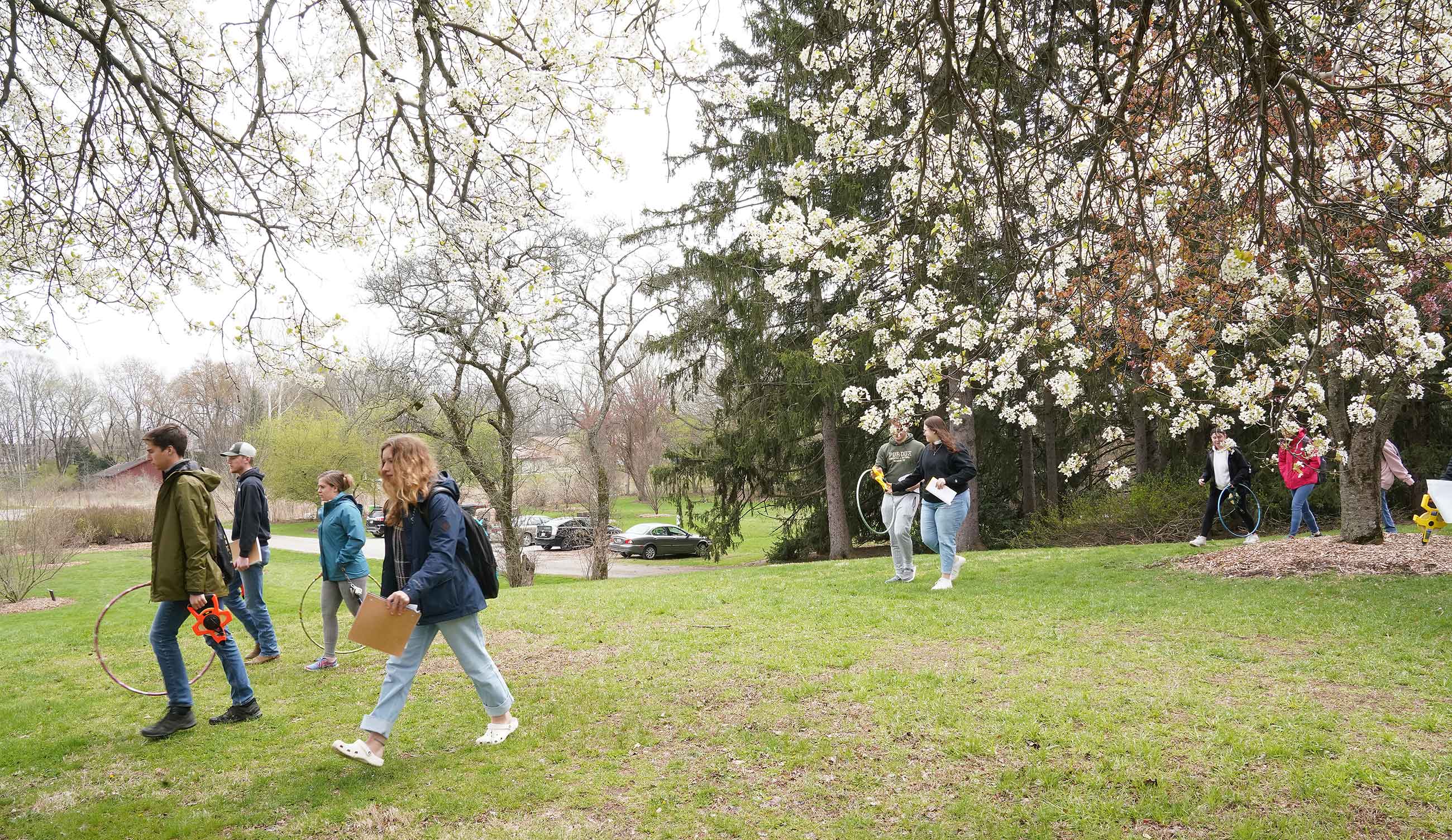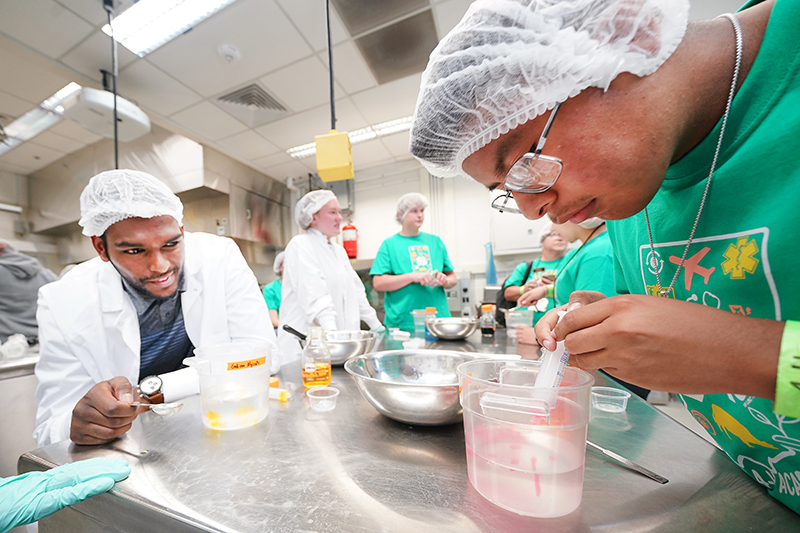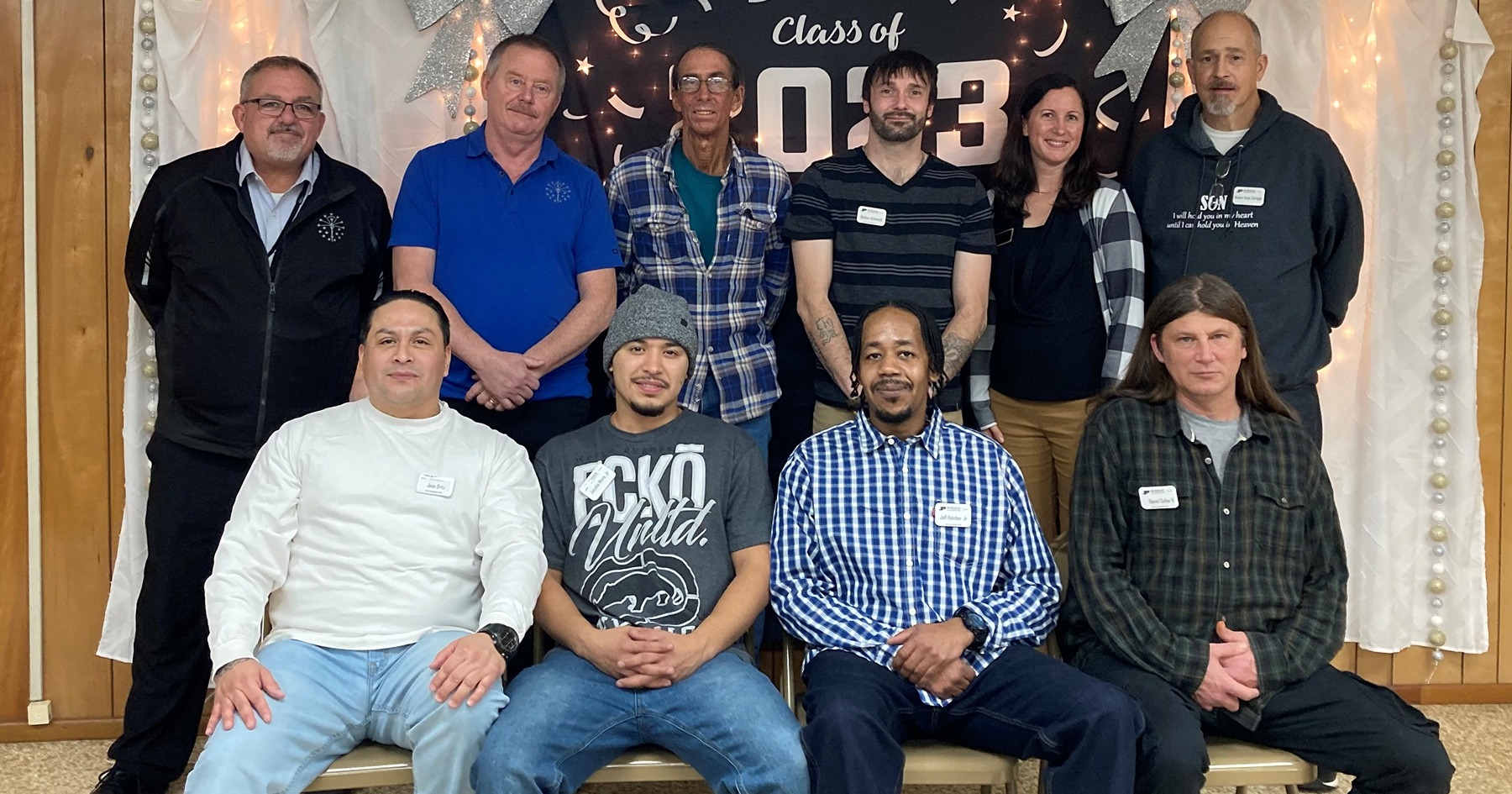Wells County
The Cooperative Extension Service is one of the nation's largest providers of scientific research-based information and education. It's a network of colleges, universities, and the U.S. Department of Agriculture, serving communities and counties across America. The Purdue University Cooperative Extension Service program areas are:
Agriculture and Natural Resources
Health and Human Sciences
Community Development
4-H Youth Development
Purdue Extension is a service tailored to meet the needs of Indiana, needs we know firsthand. Our educators, specialists, and volunteers live and work in all 92 Indiana counties. We provide the link between Land Grant research and Indiana citizens. In doing that we provide practical solutions to local issues. We provide information and expertise that's available in the form you want, when you want it. That's Purdue Extension, Indiana's home team advantage.
What We Do
We improve lives and livelihoods by delivering tested and trusted educational resources. The Cooperative Extension Service is one of the nation's largest providers of scientific research-based information and education. It's a network of colleges, universities, and the U.S. Department of Agriculture, serving communities and counties across America. The Purdue Extension focuses on: Agriculture and Natural Resources, Human and Health Sciences, Economic and Community Development and 4-H Youth.
Contact Us
Purdue Wells County Extension
horan@purdue.edu
1240 4-H Park Road
Bluffton, IN 46714
(260) 824-6412
2024 Wells County 4-H Rule Book
Check out the 2024 Wells County 4-H Rule Book for updated information about your 4-H projects.
2024 Wells County 4-H Rule BookServSafe Classes Offered
For more information and a list of available trainings and exams in our area visit the Purdue ServSafe link below.
Learn More HereWells County Newsletters
Check out Health and Human Science Newsletters with helpful articles on health, nutrition, family and finances.
The March/April 2024 edition includes the following articles:
Good Sleep for Good Health: Get the Rest YOu Need
Sometimes, the pace of modern life barely gives you time to stop and rest. It can make getting a good night’s sleep on a regular basis seem like a dream.
But sleep is as important for good health as diet and exercise. Good sleep improves your brain performance, mood, and health.
Not getting enough quality sleep regularly raises the risk of many diseases and disorders. These range from heart disease and stroke to obesity and dementia.
There’s more to good sleep than just the hours spent in bed, says Dr. Marishka Brown, a sleep expert at NIH. “Healthy sleep encompasses three major things,” she explains. “One is how much sleep you get. Another is sleep quality—that you get uninterrupted and refreshing sleep. The last is a consistent sleep schedule.”
People who work the night shift or irregular schedules may find getting quality sleep extra challenging. And times of great stress can disrupt our normal sleep routines. But there are many things you can do to improve your sleep.
Sleep for Repair
Why do we need to sleep? People often think that sleep is just “down time,” when a tired brain gets to rest, says Dr. Maiken Nedergaard, who studies sleep at the University of Rochester.
“But that’s wrong,” she says. While you sleep, your brain is working. For example, sleep helps prepare your brain to learn, remember, and create.
Nedergaard and her colleagues discovered that the brain has a drainage system that removes toxins during sleep.
“When we sleep, the brain totally changes function,” she explains. “It becomes almost like a kidney, removing waste from the system.”
Her team found in mice that the drainage system removes some of the proteins linked with Alzheimer’s disease. These toxins were removed twice as fast from the brain during sleep.
Everything from blood vessels to the immune system uses sleep as a time for repair, says Dr. Kenneth Wright, Jr., a sleep researcher at the University of Colorado.
“There are certain repair processes that occur in the body mostly, or most effectively, during sleep,” he explains. “If you don’t get enough sleep, those processes are going to be disturbed.”
Sleep Myths and Truths
How much sleep you need changes with age. Experts recommend school-age children get at least nine hours a night and teens get between eight and 10. Most adults need at least seven hours or more of sleep each night.
There are many misunderstandings about sleep. One is that adults need less sleep as they get older. This isn’t true. Older adults still need the same amount. But sleep quality can get worse as you age. Older adults are also more likely to take medications that interfere with sleep.
Another sleep myth is that you can “catch up” on your days off. Researchers are finding that this largely isn’t the case.
“If you have one bad night’s sleep and take a nap, or sleep longer the next night, that can benefit you,” says Wright. “But if you have a week’s worth of getting too little sleep, the weekend isn’t sufficient for you to catch up. That’s not a healthy behavior.”
In a recent study, Wright and his team looked at people with consistently deficient sleep. They compared them to sleep-deprived people who got to sleep in on the weekend.
Both groups of people gained weight with lack of sleep. Their bodies’ ability to control blood sugar levels also got worse. The weekend catch-up sleep didn’t help.
On the flip side, more sleep isn’t always better, says Brown. For adults, “if you’re sleeping more than nine hours a night and you still don’t feel refreshed, there may be some underlying medical issue,” she explains.
Sleep Disorders
Some people have conditions that prevent them from getting enough quality sleep, no matter how hard they try. These problems are called sleep disorders.
The most common sleep disorder is insomnia. “Insomnia is when you have repeated difficulty getting to sleep and/or staying asleep,” says Brown. This happens despite having the time to sleep and a proper sleep environment. It can make you feel tired or unrested during the day.
Insomnia can be short-term, where people struggle to sleep for a few weeks or months. “Quite a few more people have been experiencing this during the pandemic,” Brown says. Long-term insomnia lasts for three months or longer.
Sleep apnea is another common sleep disorder. In sleep apnea, the upper airway becomes blocked during sleep. This reduces or stops airflow, which wakes people up during the night. The condition can be dangerous. If untreated, it may lead to other health problems.
If you regularly have problems sleeping, talk with your health care provider. They may have you keep a sleep diary to track your sleep for several weeks. They can also run tests, including sleep studies. These look for sleep disorders.
Getting Better Sleep
If you’re having trouble sleeping, hearing how important it is may be frustrating. But simple things can improve your odds of a good night's sleep.
Treatments are available for many common sleep disorders. Cognitive behavioral therapy can help many people with insomnia get better sleep. Medications can also help some people.
Many people with sleep apnea benefit from using a device called a CPAP machine. These machines keep the airway open so that you can breathe. Other treatments can include special mouthguards and lifestyle changes.
For everyone, “as best you can, try to make sleep a priority,” Brown says. “Sleep is not a throwaway thing—it’s a biological necessity.”
Source: National Institutes of Health
Mastering Home Food Preservation Workshop
Purdue Cooperative Extension Service will be offering a Mastering Home Food Preservation class April 30 - May 3, 2024. The class will take place 9am - 5pm.
The training will be held at the Community Learning Center, 401 E Diamond Street, Kendallville, IN 46755.
Cost for this training is $275 and will cover the following topics:
- Food Safety
- Boiling Water Canning
- Pressure Canning
- Pickling & Fermenting
- Freezing & Dehydrating
- Jams & Jellies
Register at: https://cvent.me/yywPm2. For more information, contact Abigail Creigh at 260-636-2111, or creigh@purdue.edu.
you can help Purdue's broadband team
The federal government, in partnership with states, is deploying broadband funds through the Broadband Equity, Adoption, and Deployment program, also know as BEAD. Indiana is receiving close to $870 million starting mid to late 2024. A map put together by the FEderal Communications Commission or FCC, the government entity that regulates telecommunications, will dictate where these funds go, so we need to make sure Indiana's broadband map is as accurate as possible. Click HERE to see how you can help!
Wells County Community Health Fair
Who is putting it on: Indiana Immunization Coalition
When: April 3, 2024 from 2-5pm
Where: Wells County Fairgrounds, Community Center, 1240 4-H Park Road, Bluffton, IN 46714
Cost: All services are FREE
**First 50 people will receive a free hygiene kit (min. $25 value), a pack of diapers, and a $10 gas card
Purdue Extension Offerings at Bluffton Parks Department Senior Snippets Program
DEHYDRATING 101
Ever wonder about dehydrating foods? Whether you’re thinking about getting a dehydrator or have one but need guidance, this class is for you! Make sure to sign up for both sessions of this 2 part workshop.
Both Workshops are FREE!
Session 1 of 2
April 15, 2024, 2:00 PM
Washington Park Pavilion, Bluffton
Call 824-6069 to register
Objectives
- Basic methods and techniques for dehydration
- Choosing healthy foods to dehydrate
- Learn to safely preserve food through dehydration
- Hands-on demonstration of the process
Session 2 of 2
April 22, 2024, 2:00 PM
Washington Park Pavilion, Bluffton
Call 824-6069 to register
Objectives
- Learn effective storage methods for long-term preservation.
- Explore how dehydrated foods enhance a healthy diet
- Sample healthy dehydrated snacks
Cooking With an Air Fryer
May 6, 2024, 2:00 PM
Washington Park Pavilion, Bluffton
Considering whether an air fryer would be beneficial for your kitchen or do you already have an air fryer, but aren’t sure how to use it? Join us for this class on air fryer basics!
Objectives
- Basics of Air Frying and different air fryer models
- Cooking/Food Safety Tips
- Air Fryer Safety Tips
- Recipes
- Demonstration and Samples
Call 824-6069 to register
Workshop is Free!
Dejunking Your Diet:
The Drawbacks of Ultra-Processed Foods
Eating healthy isn’t always easy. Expert-recommended diets often emphasize fresh, whole foods and home-cooked meals. But that can be expensive and time-consuming. Highly processed foods are often cheap and convenient. But they also tend to be high in calories, added sugar, saturated fat, and salt, and low in fiber.
Scientists are starting to learn that highly processed foods can have certain effects on your body that may make sticking to your healthy eating goals even harder. Eating too much of them may lead to weight gain and increase your risk for certain diseases, like cancer, diabetes, and obesity.
What Are Ultra-Processed Foods?
Most foods that we eat are processed to some extent—they’re modified from how they exist in nature. Chopping, grinding, drying, cooking, and freezing are all forms of food processing. Some forms of processing are good for your health. For example, cooking meat and pasteurizing milk can help prevent foodborne diseases. But if your food is processed too much, it may be harmful to your health.
Ultra-processed foods are those that have undergone the greatest level of processing. As a general rule, ultra-processed foods are those that have been made using additives, ingredients that you wouldn’t likely have in your home kitchen. These include things like hydrogenated oils, isolated proteins, and high-fructose corn syrup. Ultra-processed foods are often made using industrial processes that you can’t easily do at home.
“If you’re standing in the grocery store, in one of the middle aisles, and the thing that you’re holding is in a crinkly package, you’re probably holding an ultra-processed food,” says Dr. Alexandra DiFeliceantonio, a neuroscientist who studies health behaviors at Virginia Tech.
Ultra-processed foods are designed to be low cost and have long shelf lives. They’re tasty, convenient, and ready to eat. Examples include carbonated soft drinks, chips, chicken nuggets, and sausages. Having too much of these in your diet may result in overeating and can be harmful to your health.
Understanding Overeating
It’s difficult for scientists to study exactly how ultra-processed foods affect overeating. That requires carefully controlling people’s diets for weeks at a time.
But NIH metabolism researcher Dr. Kevin Hall has done just that. In a recent study, he compared calorie intake and weight gain in participants who ate a highly processed diet with those who ate a minimally processed diet. Study participants stayed at NIH’s Metabolic Clinical Research Unit for four weeks, spending two weeks on each diet. Both diets offered the same amount of calories, sugar, fiber, fat, sodium, and carbohydrates on a daily basis. Participants could eat as much or as little as they wanted.
When people were on the diet with ultra-processed foods, they ate about 500 more calories each day. They also gained about 2 pounds on average. In contrast, when they were on the less-processed diet, they lost about 2 pounds.
The differences weren’t due to different nutrients in the overall diet. And, the participants rated the meals on both diets as equally pleasant. So why did people eat more of the diet filled with ultra-processed foods? The researchers aren’t sure.
Hall’s team is now looking at what else might be in ultra-processed foods that leads people to overeat. The brain may react differently to those foods, he says, or the gut may send out different signals after they’re digested.
The tendency for ultra-processed foods to lead to overeating may partly explain the recent rise in obesity. “But we rely on ultra-processed foods too much to get rid of them,” Hall says. “They’re tasty, they’re convenient, and it doesn’t take much time or effort or skill to prepare them.”
Hall hopes that a better understanding of what’s causing increased calorie consumption can help guide how such foods are made, or which ones people choose to eat.
“If we had ways to target problematic foods by understanding how they cause overeating, that might help manufacturers reformulate those foods so that they no longer cause problems,” says Hall. “Or it might help policymakers come up with ways to regulate potentially problematic foods.”
Changing the Brain
One way that ultra-processed foods might lead to overeating is by altering the brain. DiFeliceantonio’s team is using MRI scans to see how ultra-processed foods affect the brain’s reward system. These are the parts of the brain that are activated by pleasure and drive us to seek it out. DiFeliceantonio is studying whether a diet high in ultra-processed foods affect this system, and if the changes lead to people eating more when they’re not hungry.
If consuming ultra-processed foods and drinks might make you want more, does that mean you can get addicted to them? Right now, it’s not clear whether ultra-processed foods are addictive. But some studies suggest they might be.
“These ultra-processed, highly rewarding foods have way more in common with a cigarette than they do with an apple or an orange or black beans,” says Dr. Ashley Gearhardt, a clinical psychologist who studies overeating behaviors at the University of Michigan. “Some of the same brain circuitry turns on when we’re craving drugs as when we’re craving these ultra-processed foods.”
Gearhardt says that eating ultra-processed foods may lead to a compulsive habit. This means you have difficulty cutting back even when you want to. This is similar to what happens with addictive substances.
Addictive substances can also cause withdrawal symptoms when you stop taking them. Symptoms can include irritability, agitation, depression, and strong cravings for the substance. Gearhardt and others are studying whether cutting back on ultra-processed foods can cause similar withdrawal symptoms. This research may help explain why eating healthier can be harder for some people.
“Right now, we tell people they should feel better if they’re eating healthier,” Gearhardt says. “But we hear a lot of people say: ‘When I start to eat healthier, I feel so irritable and agitated. My cravings are so strong that I don’t feel better. I feel worse.’”
If we recognize that these symptoms can occur, we could give people strategies to manage them, says Gearhardt. That might make it easier for people to change their eating habits.
Source: National Institutes of Health
A PDF version of this newsletter is available HERE.
News Notes for Parents is a newsletter geared towards parents with children ages 8 and under. You will find articles about parenting, early childhood education, nutrition and much more.
In the April 2024 issue of News Notes for Parents, you will find the following articles:
Increase Your Children's Nutrition Know-How
Helping your kids understand how to read food labels prepares them for making smart food choices their whole lives. Whether in the supermarket, at home or at school, there are many opportunities to teach your child about nutrition.
For younger children, focusing on MyPlate, food groups and eating mindfully is a great place to start. Older children and teens can learn about individual nutrients on the Nutrition Facts label and how to decipher food label claims.
At Home
Teaching children the basics of nutrition and label-reading can be done easily at home, with many examples of foods they like to eat with nutrition information on hand. Try some of these tips to teach them about healthful eating.
- Enlist your child to help plan a meal based on MyPlate. Discuss themes such as varying protein sources, choosing whole grains and selecting colorful fruits and vegetables.
- When snacking, have your teen take a look at the Nutrition Facts label and serving size to discover what is in the food they're eating.
At the Supermarket
Label-reading in the supermarket is important because that's where most of the food in the home comes from. Send your child on a scavenger hunt to find nutritious options:
- Canned fruit packed in water or their own juices.
- Frozen vegetables with no salt added.
- Whole-grain cereal that is low in sugar and high in fiber.
In the Lunchroom
It might be hard to monitor what foods children eat in the lunchroom, so it is best to encourage them to make healthy choices.
- Challenge your child to pack a lunch modeling MyPlate.
- Encourage your child to read the labels of cafeteria items, and choose items low in added fats, sugars and salt.
- Review cafeteria menu offerings and discuss with your child what options they might choose that would provide each of the food groups in MyPlate that together create a balanced, healthful meal. (For example, ask your child what they will take for a vegetable, fruit, whole grain and protein food.)
- Leave a friendly note for your child about the healthy options in their lunch and why they are included.
Source: eatright.org
Teaching Your kids about taxes
It seems appropriate to talk about taxes since it is April. One might ask how you teach this concept to young children. Sure, it can be challenging, but it's possible to introduce some basic concepts in a way that's understandable and even fun for them! Here are a few tips that you can use when teaching your kiddos:
- Start with the basics! Explain what taxes are in simple terms. For example, you can say something like, "Taxes are money that we pay to the government to help pay for things like schools, roads, and parks."
- Try using everyday examples! Look for opportunities in everyday life to talk about taxes. For example, when you go shopping, you can explain that part of the money you spend goes towards taxes.
- Make it relatable! Try to relate taxes to something your kiddo(s) already understands. You could use an allowance as an example, explaining that just like they might set aside a portion of their allowance for savings, taxes are like the money adults set aside to pay for things the government provides.
- Make sure to keep it positive! Emphasize the benefits of taxes, such as how they help support important services like schools and hospitals. You can explain that paying taxes is a way to contribute to the community and help make it a better place for everyone.
- Lead by example! When you pay your taxes, explain what you are doing and why you are doing it. This can help reinforce the idea that paying taxes is a normal and necessary part of life. Remember to keep the explanations age-appropriate and to answer any questions they might have patiently. The goal is to lay a foundation of understanding that can be built upon as they grow older.
Source: OpenAI (2024) ChatGPT (February 29 version) [Large language model]. http://chat.openai.com
emoji omelets
Allow your kiddos to be creative. Try making these quick fun omelets using a round cookie cutter, olives, shredded cheese, and cherry tomatoes! Recipe below serves 4.
Ingredients
5 eggs
2 tablespoons milk
1/8 teaspoon pepper
4 cherry tomatoes, sliced thinly *use for emoji eyes
½ small red or green sweet pepper cut into strips *use for emoji eyebrows
2 tablespoons sliced black olives *use for emoji eyes
½ cup shredded cheddar or mozzarella cheese *can be used for emoji hair
1/4 cup chopped fresh parsley * can be used for emoji hair
Directions
Before you begin: Wash your hands.
- Whisk eggs, milk, and pepper in a small bowl.
- Spray a 10-inch skillet with cooking spray. Heat over medium-low heat. Pour in egg mixture; cover and cook, without stirring, until just set, 7 to 10 minutes. Slide the omelet onto the cutting board; let cool for a few minutes.
- Cut four circles out of the omelet using a large (approximately 3 ½ inch/9 cm) round cookie cutter. Create egg faces using cherry tomatoes, peppers, olives, cheese, and parsley to make eyes, nose, mouth, and hair. Leftover bits of omelet can be used as well.
Tip: Place tomatoes, peppers, olives, cheese and parsley in small bowls and let everyone create their own faces!
Source: Egg Farmers of Canada - https://www.eggs.ca/recipes/emoji-eggs
A PDF Version of News Notes to Parents is available HERE.
A spanish version of News Notes to Parents is available HERE.
- We are so proud of your hard work and dedication towards the Wells County 4-H Program over the last 10 years. There will be a presentation during the 4-H Fair to recognize all 10-year members! Recognition forms will be available in the Purdue Extension - Wells County Office starting on April 15th. Make sure to stop by and pick one up! They will also be available online at www.extension.purdue.edu/wells.
- Sunday, May 5th, 2024
- 4:00 - 7:00 PM
- Cattle Barn, 4-H Park
- Stay tuned for more details coming soon! Goat and Sheep members will receive a mailing with details for ID Day in the following weeks.
- Saturday, April 6, 2024
- 8:00 - 11:00 AM
- Cattle Barn, 4-H Park
- Enter Park on Spring Street
- Please enter the park on Spring Street, take the West Drive going to the back of the park to the west side of the cattle barn.
- All Dairy Feeder steer calves must be weighed and ear-tagged at the County ID Day. Calves cannot weigh more than 250 pounds at ID Day (suggested birthdates: February 15th - April 1st).
- If you have any questions, contact Dairy Feeder Calf Superintendents Karl Steiner (260-827-8299), Nathan Boxell (260-402-4679), or the County Extension Office at 260-824-6412.
- 4-H Academy is a program held at Purdue University specifically designed to offer hands-on, exciting opportunities to learn about a diverse selection of subjects and careers. During this conference previously known as 4-H Science Workshops, participants will meet and learn from professors, graduate students and other experts in their respective fields and participate in interactive activities and experiential learning. Participants stay in a Purdue University Residence Hall for two nights while exploring the Purdue University campus and meeting 4-H members from across Indiana. 4-H Academy at Purdue is open to all youth grades 9-12.
- 4-H Academy runs from June 12-14, 2024. Interested youth should reach out to aaulbach@purdue.edu by May 1st to begin the registration process.
- Registration for 4-H Camp opens on March 1st!! You can register online through your 4-H Online account. Follow the steps below:
- Log in to your 4-H Online account at https://v2.4honline.com
- Click “View” (in blue) next to the name of the 4-H member you want to register
- Next, click on “Events” on the left side of the screen (on a mobile device, click the 3 gray lines to open the menu).
- Click on “Register for a New Event” (in blue)
- Select “2024 Northeast Indiana 4-H Camp” and click “Next”
- Select on your camper type and click “Start Registration”. Follow through prompts until submitted.
- Send or bring payment to Purdue Extension - Wells County by May 1st.
- Registration will not be considered complete until payment has been received.
- Cost for each Wells Co. camper is $95.00
- If you are needing to add or drop any projects, please contact the Extension Office no later than May 15th. This will help our office with organization before the fair, and knowing how much space we will need for all projects to be displayed properly.
- Updated Rulebooks are available for purchase in the Extension Office. The cost for a paper copy of the Rulebook with the binder is $7.00, and just the paper copy no binder is $3.00. You can also find a PDF version of the Rulebook online at www.extension.purdue.edu/wells.
- June 24-26, 2024
- 4-H Round-Up is an opportunity for youth who have completed grades 7-9 to visit Purdue University’s campus and explore a variety of career paths by attending hands-on classes created just for Round-Up attendees. Supported by 4-H chaperones, participants get a taste of college life by living in a Purdue Residence Hall for two nights, eating in a University dining hall, and exploring campus. Youth enjoy building friendships with 4-H’ers from across the state during recreation events planned in the evenings and blocks of free time. Interested youth should reach out to aaulbach@purdue.edu.
- We are looking for interns to join our team this summer! Applications are now available in the Extension Office and online at www.extension.purdue.edu/wells. Applications are due by April 15th. Interviews will be scheduled based on availability of applicant and Extension Staff.
- Friday, May 10, 2024
- 4:30 - 7:00PM
- Ossian Enterprise Park
- Major League Creamery Tickets: $5.00/ticket - Good for one ice cream or shaved ice
- Uncle Matt’s BBQ Shack Tickets:
- Take and Bake - Memphis BBQ Pork Spaghetti: $18.00/4 services or $30.00/8 servings
- Single Meals: $11.00/ticket - Pulled Pork Sandwich or Double Mac & Cheese (meals served with mac & cheese, applesauce, chips and a cookie)
- Tickets can be purchased now through April 25th from any Jefferson Knightrider member or by contacting Kari Baker (260-494-5594). The Jefferson Knightriders appreciate all your support!!
- Chester Chargers - Monday, April 1st @ 6:30PM at Southern Wells Community Church
- Lancaster Achievers - Monday, April 8th @ 7:00PM in the Meeting Rooms
- Nottingham Nobles - Thursday, April 11th @ 6:30PM in the Expo Hall
- Hurryin’ Harrisons - Sunday, April 21st @ 7:00PM in the Meeting Rooms
- Jefferson Knightriders - Monday, April 22nd @ 5:30PM at Hope Missionary North Campus
- Archery Club begins THIS month! Reminder that you should attend one meeting per week, but not both meeting days. Here are the meeting dates for April:
- Thursday, April 18th - 6:30PM - Quonset Hut
- Saturday, April 20th - 10:00AM - Quonset Hut
- Thursday, April 25th - 6:30PM - Quonset Hut
- Saturday, April 27th - 10:00AM - Quonset Hut
- Tuesday, April 9th at 6:00PM
- Junior Leader Booth
- Junior Leaders - we will be packing bags for the Backpack Program during our meeting on April 9th. Please meet out at the Junior Leader Booth. See you there!
- Dairy Goat members will be meeting on Friday, April 19th at 6:30PM in the Meeting Rooms at the 4-H Park. A light supper will be provided.
- There will be a Dairy Goat Showmanship Clinic held on Saturday, May 11th at 10:30AM in the H-Barn Show Arena. Feel free to bring your goat with you. We will be having a picnic lunch following the clinic.
- Tuesday, April 9th at 6:30PM
- Community Center Expo Hall
- Parents are encouraged to join us as we celebrate the great accomplishments and improvements of the 4-H BB & Rifle Members!
- A quest speaker will be there to speak to 4-H youth and parents.
- Light refreshments provided.
- Premise ID:
- 4-H Livestock members with cattle, swine, sheep and goats need to have a Premise ID. This number is assigned to a farm location where your animals reside. If your farm does not have an ID, you can get one from the Indiana Board of Animal Health at 317-544-2381 or by email at animalid@boah.in.gov.
- DNA Hair Samples:
- All beef cattle, dairy beef, dairy feeder, dairy cattle, sheep, meat goats, and swine you may possibly want to exhibit at the Indiana State Fair must turn in DNA hair samples for each of those animals. DNA envelopes are available at the Wells County Extension Office. Due to the Wells County Extension Office no later than 4:30PM on May 15th.
- 4-H Online Animal ID:
- With the exception of dogs, cats, and poultry, all animals you may exhibit at the Wells County 4-H Fair or Indiana State Fair must be identified in 4-H Online by May 15th. Animals not identified in 4-H Online by May 15th with NOT be eligible to show at the Wells County or State Fairs. All livestock exhibitors should have a premise ID - these can be obtained through the Indiana Board of Animal Health.
- QLC/YQCA:
- Exhibitors enrolled in the beef cattle, dairy cattle, swine, sheep, meat goats, dairy goats, poultry and rabbit project must complete either QLC or YQCA by July 1st.
- In-person training costs $3.00 per person and lasts approximately 1 hour. Trainings will be held in the Community Center at the 4-H Park.
- Register online at https://v2.4honline.com
- April 17th at 6:00PM
- May 29th at 10:00AM
- May 29th at 1:00PM
- May 29th at 6:00PM
- Those completing YQCA must turn in a copy of their certificates by July 1st - late submissions will NOT be accepted, no exceptions. You can drop certificates off to the Extension Office or email a PDF version to mcorle1@purdue.edu or hoover21@purdue.edu
- Animal Possession Agreement:
- The Animal Possession Agreement form should be filled out by all 4-H members whose animal projects do not reside on their property. This form should be completed and turned in to the Purdue Extension - Wells County Office by May 15th. Please note that this is a change from last year! If your animals reside on your property, or you filled out the animal leasing form, you do NOT need to fill out the Animal Possession Agreement form.
- Saturday, May 4th
- 11:00 AM - 5:30 PM
- Bobcat of Fort Wayne South (633 N Main Street Ste #2, Bluffton, IN)
- Members of the Meat Goat and Sheep projects are currently selling Texas Tenderloin tickets! Check out the details below. To purchase pre-sale meal tickets, please reach out to a member of the Meat Goat and Sheep project!
- $15.00/ticket - Meal includes a tenderloin sandwich, fries, cookie, and a drink.
- Saturday, April 20th
- 11:00 AM - 2:00 PM
- Bluffton Walmart Parking Lot
- $10.00/ticket - includes a Port-A-Pit chicken half
- If you are interested in purchasing a ticket, please reach out to a Horse & Pony member! Thank you for all your support towards the Wells County 4-H Horse & Pony Club!!
- 4-H Association: Monday, April 15th at 7:00PM in the Meeting Rooms
- Club Leaders: Tuesday, April 9th at 7:00PM in the Meeting Rooms
- 4-H Foundation: Monday, April 15th at 6:30PM in the Conference Room
-
The 4-H Association is going to be doing some clean up around the 4-H Park. They are asking for your help! Gather your friends, family, club members, church groups, and school groups to come and help get our Fairgrounds ready for the Wells County 4-H Fair!
- Saturday, April 20th
- Saturday, May 4th
- Stay tuned for times!
-
If you can, it would be helpful for you to bring rakes, gloves, and/or leaf blowers to help clean up the grounds! Thank you in advance for your help this spring!








